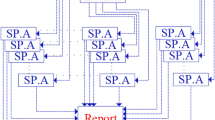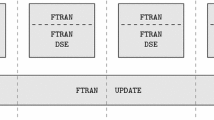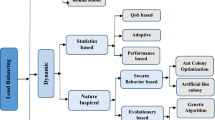Abstract
Multi-cluster environments are composed of multiple clusters of computers that act collaboratively, and thus allowing computational problems to be treated that require more resources than those available in a single cluster. However, the degree of complexity of the scheduling process is greatly increased by the heterogeneity of resources and co-allocation process, which distributes the tasks of parallel jobs across cluster boundaries.
This work presents a new scheduling strategy that allocates multiple jobs from the system queue simultaneously on a heterogeneous multicluster, by applying co-allocation when is necessary. Our strategy is composed by a job selection function and a linear programming model to find the best allocation for multiple jobs. The proposed scheduling technique is shown to reduce the execution times of the parallel jobs and the overall response times by 38% compared with other scheduling techniques in the literature.
Similar content being viewed by others
References
Javadi B, Akbari MK, Abawajy JH (2006) A performance model for analysis of heterogeneous multi-cluster systems. Parallel Comput 32(11–12):831–851
Bucur AID, Epema DHJ (2007) Schedulling policies for processor coallocation in multicluster systems. IEEE Trans Parallel Distrib Syst 18(7):958–972
Lérida JL, Solsona F, Giné F, García JR, Hernández P (2008) Resource matching in non-dedicated multicluster environments. In: VECPAR’08, pp 160–173
Jones W, Ligon W, Pang L, Stanzione D (2005) Characterization of bandwidth-aware meta-schedulers for co-allocating jobs across multiple clusters. J Supercomput 34(2):135–163
Abawajy J, Dandamudi S (2003) Parallel job scheduling on multicluster computing systems. In: IEEE Int Conf CLUSTER’03, pp 11–18
Heien EM, Fujimoto N, Hagihara K (2008) Static load distribution for communicative intensive parallel computing in multiclusters. In: IEEE Conf PDP’08, pp 321–328
Yang C, Tung H, Chou K, Chu W (2008) Well-balanced allocation strategy for multiple-cluster computing. In: IEEE Int Conf FTDCS’08, pp 178–184
Naik VK, Liu C, Yang L, Wagner J (2005) Online resource matching for heterogeneous grid environments. In: IEEE/ACM Int Conf CCGRID’05, vol 2, pp 607–614
Hamscher V, Schwiegelshohn U, Streit A, Yahyapour R (2000) Evaluation of job-scheduling strategies for grid computing. In: IEEE/ACM Int Conf GRID’00, pp 191–202
Braun TD, Siegel HJ, Beck N, Bölöni L, Maheswaran M, Reuther AI, Robertson JP, Theys MD, Yao B, Hensgen DA, Freund RF (2001) A comparison of eleven static heuristics for mapping a class of independent tasks onto heterogeneous distributed computing systems. J Parallel Distrib Comput 61(6):810–837
Author information
Authors and Affiliations
Corresponding author
Rights and permissions
About this article
Cite this article
Blanco, H., Lérida, J.L., Cores, F. et al. Multiple job co-allocation strategy for heterogeneous multi-cluster systems based on linear programming. J Supercomput 58, 394–402 (2011). https://doi.org/10.1007/s11227-011-0596-2
Published:
Issue Date:
DOI: https://doi.org/10.1007/s11227-011-0596-2




